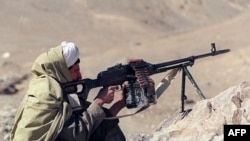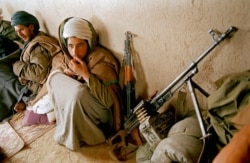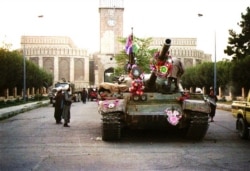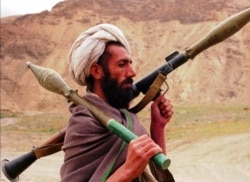The Taliban, a Pashto-language term for students of religious seminaries, were historically known as devout ascetics who avoided politics in communities across Afghanistan, Pakistan and Central Asia.
They promoted their religious devotion by highlighting how they avoided all kinds of joy or leisure in this "temporary life" with the hope of rewards in the afterlife.
It was perhaps that image of the Taliban’s piety that persuaded Afghans to welcome them in their towns in late 1994, the year the Afghan Taliban launched their movement in southwestern Kandahar province.
I was then a reporter in Peshawar, Pakistan, and first met a small group of the Taliban when they came to the office. The group was there to see a BBC correspondent, to tell the story of their rise in a faraway town in Afghanistan.
Following that day in September 1994, the Taliban captured international attention for their astonishing battlefield gains in the southwestern, southern and eastern provinces of Afghanistan. Most of those areas share a border with Pakistan and were under the control of different warlords. The locals attributed all kinds of evils to the warlords of the early 1990s, and the Taliban movement was first seen as an uprising against them.
'Warm receptions'
Mullah Ihsan Ullah, the Taliban governor in 1995, at the time bragged about the group’s acceptance among Pashtuns in Khost, the provincial capital of eastern Paktia province. “I was welcomed by the elders with warm receptions here in Khost, all the way from Kandahar, without firing a shot in the air,” he told a Western journalist and myself who had traveled to Khost to interview him.
My trip to Khost from Peshawar, through Waziristan, and into Afghanistan was an eye-opener for me. It was a smooth trip through Ghulam Khan, a border town, even though no members of my traveling group, including a Western reporter, held valid visas. The Taliban didn’t care and did not ask about our travel documents in Khost.
At that time, the Taliban already had the stigma of being seen as an extension of the Pakistani state in Afghanistan. Many fighters had studied in Pakistani madrassas and spoke Urdu, not the Pashto or Dari spoken by many Afghans. The group also was publicly supported by Pakistan’s then-Prime Minister Benazir Bhutto and others in her government.
Taliban’s early hardline policies
The Taliban claimed Khost’s “conquest,” a term they would use for control over the cities and towns, a few weeks before my trip to the province. They had already imposed their strict version of sharia fused with local tribal codes. The Taliban’s Virtue and Vice police were on alert every day to find people breaking their rules.
During the trip, I saw another face of the Afghan Taliban, which differed from their Pakistani counterparts. Fighters who had long hair, untrimmed beards, with turbans on their heads and guns slung over their shoulder, were casting threatening looks and patrolling the streets in Toyota pickup trucks. That was in complete contrast to what I saw in the madrassas in Pakistan, where they were humble, often shy and carrying religious books, with shawls over their shoulders and no weapons.
I never saw a woman walking on the street during a weeklong stay in Khost. The Taliban governor would quote the Quran, the sayings of the prophet of Islam and the Pashtun tribal codes as justification for restrictions on women’s movements in the town.
I can still recall a conversation I had with Mullah Ihsan on the touchy topic of women’s roles in Taliban-controlled areas. The gist of his argument was that sharia forbade Muslim women and men to look at one another.
He quoted a verse from Quran, starting with: “Tell, also the believing women, to guard their eyes.” Mullah Ihsan said he chose this verse to justify his vision for a woman’s role in society and explained whom a woman could talk to and what to hide or reveal about her body.
By invoking the Quran, he had essentially ended all debate on the topic in our discussion as well as in the Khost community. The Taliban governor and his male assistants had the Quran on their side of the argument, and it was a loss for Khost’s rich cultural history.
Growing up, I had heard of Khost’s contributions to Pashto folk music and the popular unique dance Attan since my childhood. The Pashto folk literature had fascinating references to the Attan dance, which originated in the Loya Paktia region of Afghanistan.
Dancing, folk literature soon gone
But dancing and folk literature were banned in Khost under the Taliban. While pre-recorded audio music cassettes were still trendy in the 1990s in Afghanistan and Pakistan, the Taliban collected cassettes they confiscated and piled them into a heap inside the premises of the governor’s house.
The cassette tapes, unwound and broken, were on display on the roadsides and markets, reminding passersby that music was forbidden under the Taliban. Taliban armed men would check all vehicles for tape recorders and cassettes as they heard "music is haram [forbidden] in Islam." Some drivers would trick the Taliban by playing religious cassettes in the cars to avoid dismantling their stereos.
By 1995, the cinema in Khost had already been converted into a mosque. Khost University was closed down. So were the schools for boys and girls, which remained shut until the Taliban’s fall in October 2001. During their rule, the Taliban expressed a number of reasons for not resuming education at schools and colleges.
“The situation is not right,” was one major argument of the Taliban for not opening schools in Afghanistan. However, they believed in only two kinds of education: religion and medicine. That’s why the madrassas flourished in Afghanistan during the Taliban era from 1995 to 2001.
Barbers worked under strict orders not to shave the beards of their customers. Instead, they trimmed men’s hair without touching their beards.
The shopkeepers and vendors in the town were required to shut down their businesses after the call for prayers, a total of five calls a day. And local trade was conducted using Pakistani rupees. Afghanistan’s own currency, the afghani, was in circulation but that was not the preferred currency for selling or buying. The civil war and the Taliban’s advancement toward Kabul and other major cities in the north had already devalued the afghani against the U.S. dollar or Pakistani rupee.
Hint of future
The Taliban’s sharia and other restrictions in Khost were a prelude to the group’s leadership style for the whole country.
While the group initially ruled with a light hand in Pashtun-majority areas, the extremists were more forceful in Kabul, Mazar-e-Sharif and Bamiyan, leading to gross violations of human rights, as they dug their heels into power.
By the time the Taliban seized control of Kabul on September 27, 1996, they had established a firm reputation as hardliners who used their austere version of Islam as a tool for governing.







